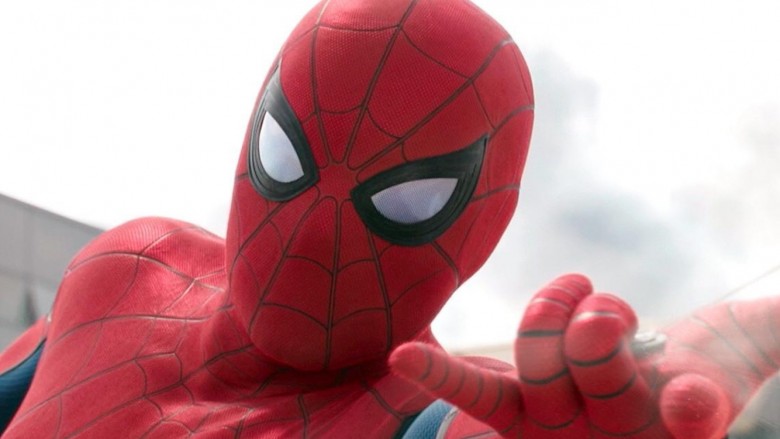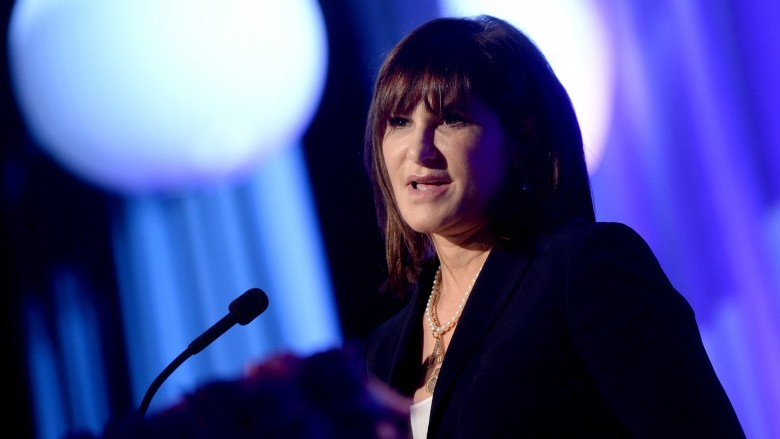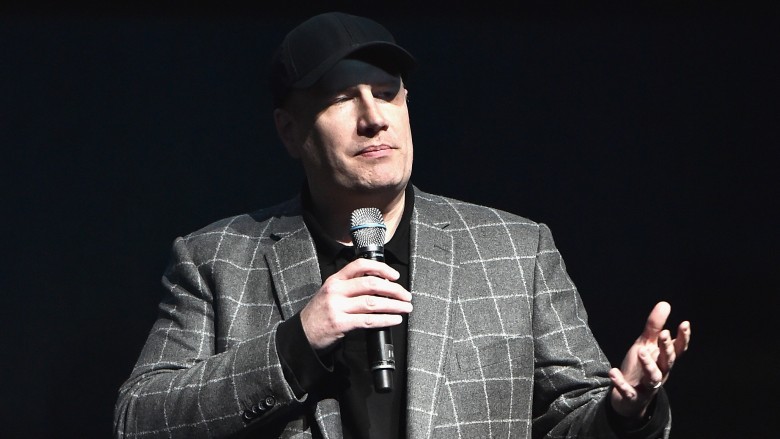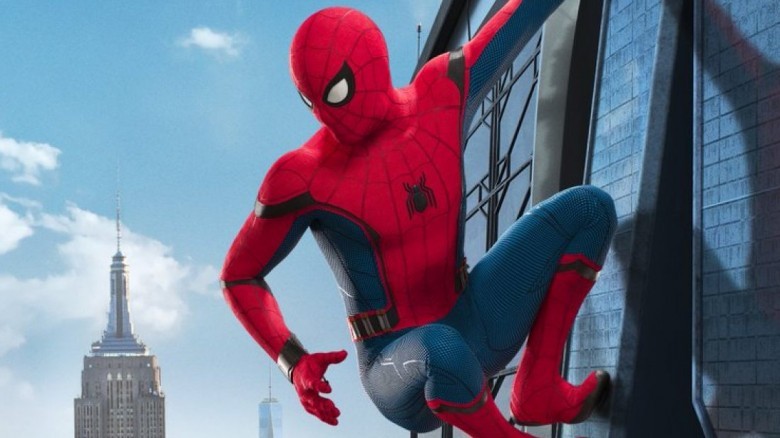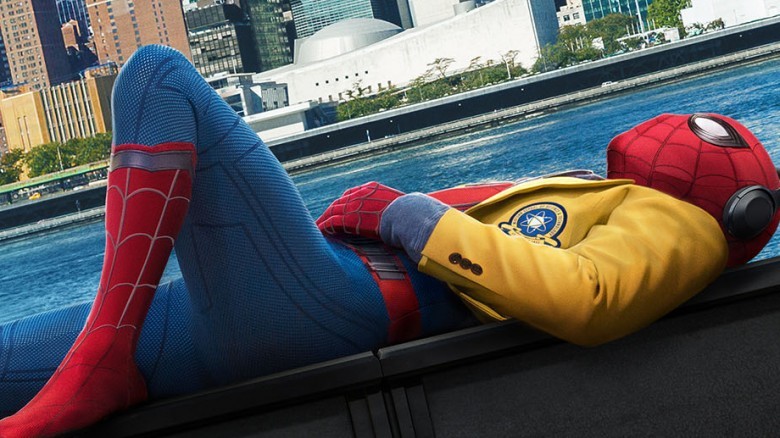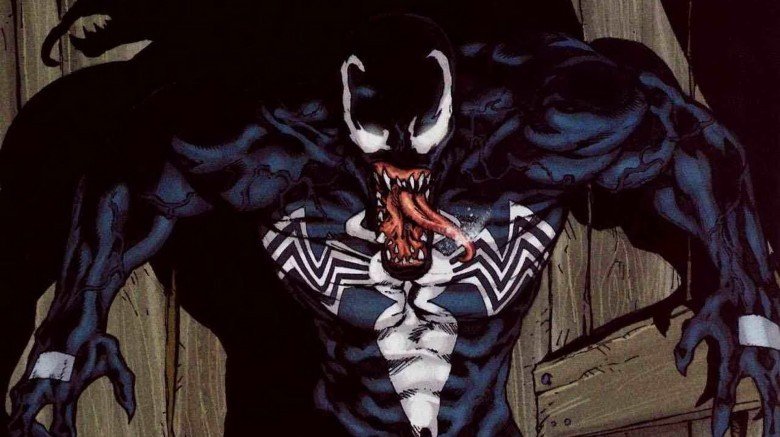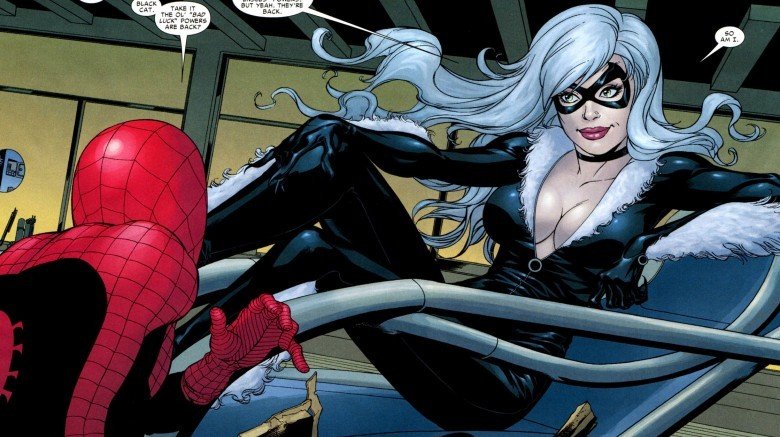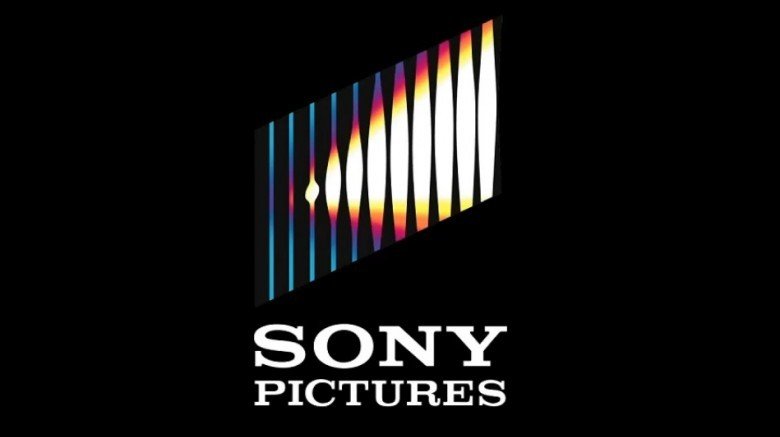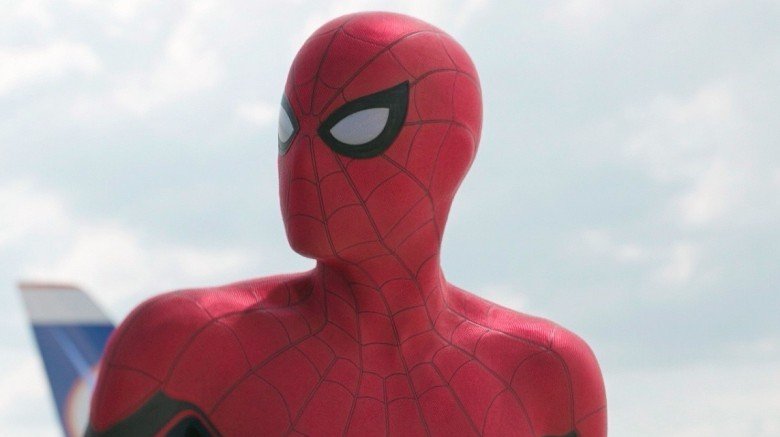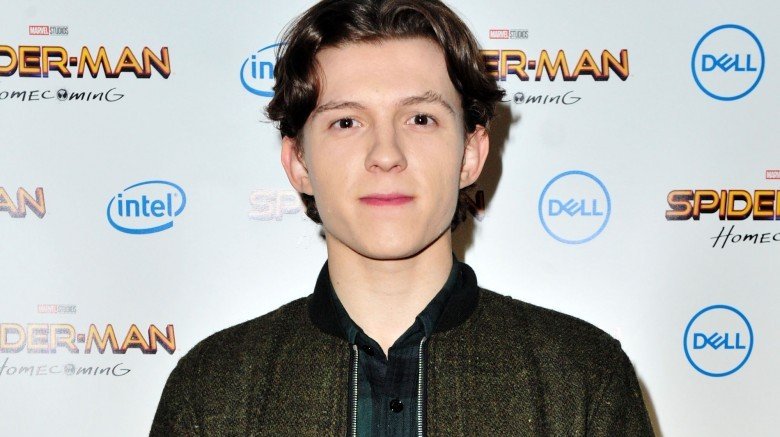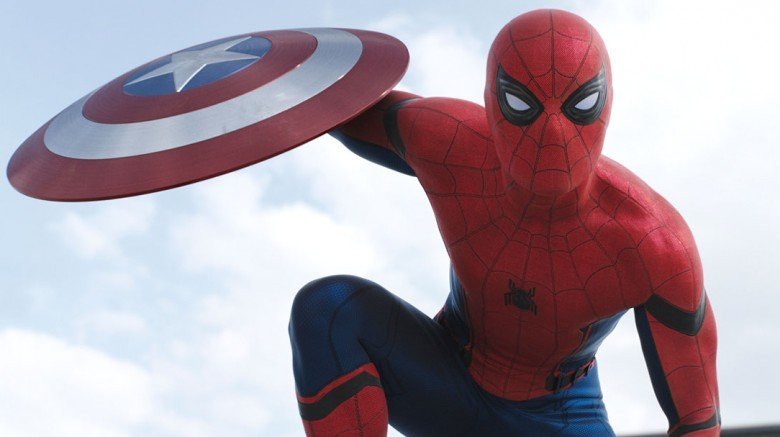The Untold Truth Of The Sony/Marvel Partnership
In March of 2017, producer and former head of Sony Pictures Amy Pascal suggested that the studio's shared custody agreement with Marvel over Spider-Man could come to an end after the sequel to Spider-Man: Homecoming. Of course, this quickly prompted widespread fan concerns, especially given that it was followed by word that Sony has plans to go forward with a solo Venom movie—and possibly a film based on Spidey nemeses Black Cat and Silver Sable—which won't be a part of the MCU and may not even involve Spider-Man.
On the surface, this makes little sense...and beneath the surface, it makes even less. Let's take a look at a few of the ins and outs of Sony and Marvel's surprising partnership—and in the process, explore the reasons why fans may have less to worry over (or be excited about) than they might think.
Sony still owns the rights
"One of the things that I think is so amazing about this experience is that you don't have studios deciding to work together to make a film very often," said Pascal. "In fact, it may never happen again—after we do the sequel." She's certainly right about the first part, but it was the second that quickly led to headlines screaming "SPIDER-MAN OUT OF THE MCU." The panic is somewhat understandable—as Pascal noted, the deal between Sony, Marvel and Disney might be singularly unique in Hollywood history, and many fans still haven't wrapped their head around the fact that Marvel still doesn't technically own the film rights to the web-slinger.
While the character is essentially on loan for his other MCU appearances, Homecoming is described by Marvel Studios exec Kevin Feige as "a Sony Pictures production of a Marvel Studios film," with Pascal co-producing and Sony chief Tom Rothman actively involved. It gets a little confusing, but it's actually a pretty sweet deal for everyone involved.
Marvel paid nothing for his appearances
As part of the deal's terms, Marvel agreed to pony up the whopping sum of a big fat goose egg to Sony for the shared character rights. It may seem a little shocking that no money changed hands to close a deal that seemed impossible before early 2015, but this fact illustrates the agreement's uniqueness. Spider-Man is one of the most profitable intellectual properties in the world, yet Sony's films were suffering severe diminishing critical and box office returns. For Sony, the Marvel partnership was a surefire strategy for restoring Spidey's drawing power to its former glory.
For Marvel, the benefits are even more obvious. The vast majority of fans were overjoyed at the prospect of Peter Parker finally getting to play in the MCU's giant sandbox, and it's safe to say his presence may have helped Captain America: Civil War to its $1.1 billion box office performance—a take Sony didn't see a penny of. According to the terms of the agreement, Marvel and Disney are entitled to 100% of the profits of any MCU film in which he appears except the solo films.
But Marvel also won't get a cut of the solo films
When it comes to Spidey's solo outings, all the box office bank still goes directly to Sony. Financially, Marvel's role and compensation structure has been compared to the type of agreement a straight-up producer, rather than a partnering studio, would have. There may be financial incentives tied to, say, certain box office milestones, but that's it. Spider-Man: Homecoming is among the most highly anticipated MCU event in years, but it won't directly constitute a big payday for Marvel Studios.
This might seem like a raw deal for Marvel, but only on the surface. The performance of the MCU's films directly affects the bottom line for every other division of the company, from print to television and merchandise. Having their flagship character on board can only be a good thing, as long as it's a version of the character that fans love—and the agreement also dictates that Marvel has the power to make sure this is the case.
Marvel still has all the creative control
Sony's Spider-fortunes started to tank after 2004's Spider-Man 2 for a simple reason: for every good creative decision they made, the studio followed it up with two or three that were questionable. Spider-Man 3 suffered from villain bloat, emo Peter Parker, and a poor take on fan favorite villain Venom; the rebooted Amazing Spider-Man series, after getting off to a somewhat promising start, was bogged down with villains and plotting problems by its second entry. Sony quite obviously had no idea what to do with the character, and if the wildly complex MCU has demonstrated anything about Marvel Studios, it's that they have a sure creative hand.
For that reason, Sony agreed to give Marvel complete creative control over Spidey, even extending to the Sony-produced solo films. This relieves them of the burden of trying to figure out how to satisfy the fans, while reaping the benefits of the enormous goodwill generated by their willingness to cooperate with Marvel in the first place.
Sony also seemed to realize that the deal was also the only solution to their creative stagnation. Spider-Man has always been defined to a large extent by his interactions and contrasts with the other heroes in the Marvel Universe, an aspect of the character Sony never would've been able to explore on their own. Most fans were relieved when their plans for a "Spider-Verse" series of spinoffs were seemingly scrapped in the wake of the deal—and then profoundly confused when these plans were later given new life.
Sony's spinoffs are within their rights
Sony's announcement of a screenwriter and release date for a revived Venom solo movie could not have come at a weirder time, mere months before the release of Homecoming. Details that were leaked over the next day or so—it's not part of the MCU, Kevin Feige has zero involvement, Spider-Man himself probably won't be featured—had fans wondering if this was some kind of extended April Fools' prank. It may not make much sense, but remember, nothing has changed in terms of Sony's ownership of Spidey's film rights and the rights to his supporting characters. If Sony wants to make a dozen of their own Spider-centric films without Marvel's involvement, they can absolutely do so.
So far, Marvel has conspicuously had nothing to say about Pascal's remarks or the announced spinoffs, and it's been speculated that there's a pretty good reason for this. For one, any comment could serve as a distraction leading up to the release of Homecoming, and it's in everybody's best interests for that film to absolutely crush it at the box office. But more importantly, it just might be that Sony is basically full of hot air.
That still doesn't mean they're happening
It's worth keeping in mind that Sony Pictures' Spider-Verse strategy, which they originally announced during the run up to The Amazing Spider-Man 2, failed to spark the interest the studio had hoped. Interest in the teased Sinister Six spinoff was low, Venom was perpetually up in the air after the character's false start in Spider-Man 3, and the studio even went so far as to seriously suggest an Aunt May spinoff film. This creative floundering led to the deal with Marvel in the first place, so Sony's apparent return to it just months before Spidey's triumphant MCU debut is utterly confounding—unless it's all a smokescreen.
As any Hollywood executive will tell you, the announcement of a screenwriter and release date doesn't mean anything is set in stone, but this particular announcement—concerning a potential tentpole project based on Marvel's flagship property, with more to follow—might very well have the short term effect of inflating Sony Pictures' value. And when it comes to its film division, the short term might be all Sony's worried about.
Sony Pictures is in bad shape
Sony's biggest performer of 2016, the Ghostbusters reboot, actually lost $70 million. In just the third quarter of the year, the studio posted a $920 million loss. It's hemorrhaging money, and when it comes to proven intellectual properties, it has a piece of only two: Spider-Man and James Bond, whose film rights are a ridiculous mess that Sony may not own a part of much longer anyway. Homecoming and its 2019 sequel are the only bright spots on the studio's horizon, and after Sony announced the departure of entertainment division CEO Michael Lynton earlier this year, speculation started ramping up that they're looking to sell off their film and television divisions.
Sony CEO Haz Kirai has consistently denied any intention to sell throughout his entire five-year tenure, but he's done little to allay these recent rumors. Lynton's position hasn't been filled, and the New York Post recently reported—citing anonymous sources—that Sony is listening to pitches from Tokyo banks, and is only waiting to see how its summer slate of movies performs before committing to a sale. The revived Spider-Verse announcement makes sense if a short-term boost in value is all Sony is looking for.
The spinoffs could seriously dilute the Spider-Market
If Sony insists on producing Spidey spinoffs separate from the MCU, there's simply no way to avoid brand confusion to some degree. With a different version of Spider-Man, Sony would only be needlessly diluting its own property; without one, these films simply have no reason to exist. The narrative gymnastics involved in creating a Spider-Verse with no Spider-Man would make any screenwriter's head explode.
Of course, if Spidey really was pulled from the MCU after his second solo appearance, then he might simply show up late to the Spider-Verse party in yet another rebooted version, which fans would be sure to just love. But as Pascal pointed out when she appeared to back off her remarks a bit, "I think we found the right formula, and I think everybody is going to want the right thing to continue." Somebody should have thought to ask her about star Tom Holland's contract—it kind of speaks for itself.
Tom Holland is contracted for six films
Tom Holland's reception as the MCU's Peter Parker was, to put it mildly, enthusiastic. Despite having only about 20 minutes of screen time, he follows in the footsteps of his co-stars by completely owning his role Captain America: Civil War. Sony and Marvel knew casting was key if audiences were going to not only accept but embrace a third cinematic iteration of Spider-Man within a 14-year period, and they nailed it—so they locked him down. At 19, Holland signed a contract that puts him on the hook for three solo movies, plus three appearances in other characters' films.
If Sony's plan was really to yank Spidey after Marvel's second film, then nothing about this adds up. Of course, Pascal may know something we don't. The full terms of the agreement with Marvel haven't been disclosed, and her comments may imply that it'll be up for renegotiation in 2019. Even if this is the case, abandoning Marvel's direction after three years to focus on a rejected vision that fans hated hardly seems like a great idea—and the odds of finding another Spidey that audiences will embrace like Holland seem slim to none.
Sony needs Marvel more than Marvel needs Sony
If Sony manages to avoid selling off its film division in the coming year or two, it will probably be because of Spider-Man: Homecoming. Some analysts are projecting the film to come close to breaking $1 billion—a huge injection of cash that wouldn't be possible without Marvel Studios. It's safe to say that a third Amazing Spider-Man film or a Sinister Six movie might not have generated quite the level of interest that greeted Homecoming. But without Sony's involvement, Marvel built the highest-grossing film franchise of all time—one that, having made household names out of Iron Man, Captain America and Ant-Man, probably would have continued to do pretty well even without Ol' Web-Head.
Sony simply needs this partnership more than Marvel does, and if this weren't true, it never would have happened. Sony played keep-away with Spider-Man's rights for 13 years, and they only came to the bargaining table because they knew working with Marvel was their only hope of saving the flagging franchise and revitalizing the beloved character. In an industry increasingly drawn to safe franchise bets, this troubled film division isn't about to second-guess the safest one it's ever made.
